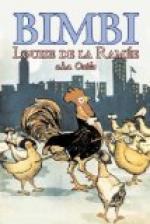Then the voice sank away in silence, and a strange golden light that had shone on the great stove faded away; so also the light died down in the silver candelabra. A soft, pathetic melody stole gently through the room. It came from the old, old spinnet that was covered with the faded roses.
Then that sad, sighing music of a bygone day died too; the clocks of the city struck six of the morning; day was rising over the Bayerischenwald. August awoke with a great start, and found himself lying on the bare bricks of the floor of the chamber, and all the bric-a-brac was lying quite still all around. The pretty Lady of Meissen was motionless on her porcelain bracket, and the little Saxe poodle was quiet at her side.
He rose slowly to his feet. He was very cold, but he was not sensible of it or of the hunger that was gnawing his little empty entrails. He was absorbed in the wondrous sight, in the wondrous sounds, that he had seen and heard.
All was dark around him. Was it still midnight or had morning come? Morning, surely; for against the barred shutters he heard the tiny song of the robin.
Tramp, tramp, too, came a heavy step up the stair. He had but a moment in which to scramble back into the interior of the great stove, when the door opened and the two dealers entered, bringing burning candles with them to see their way.
August was scarcely conscious of danger more than he was of cold or hunger. A marvelous sense of courage, of security, of happiness, was about him, like strong and gentle arms enfolding him and lifting him upwards—upwards—upwards! Hirschvogel would defend him.




